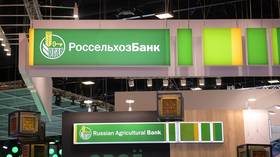Russia won’t back down on grain deal terms – Kremlin

Russia will not give up on the conditions it has set for the Black Sea grain deal to be resumed, Kremlin spokesman Dmitry Peskov said on Saturday. New proposals reportedly put forward by the United Nations would still be insufficient, he added.
“The Westerners are said to supposedly be ready to promise SWIFT access to a subsidiary of Rosselkhozbank [Russian Agricultural Bank],” Peskov said, referring to media reports about the UN proposals sent to Moscow.
Earlier this week, Reuters claimed that UN Secretary General Antonio Guterres told Russian Foreign Minister Sergey Lavrov in a letter that a Luxembourg-based subsidiary of Rosselkhozbank could apply for access to the SWIFT system “immediately” and potentially receive it within a month.
“The agreements say that access to SWIFT should be granted to Rosselkhozbank itself and not its subsidiary,” Peskov told journalists. The sides need to “go back to the basics of those agreements that were struck from the outset,” he said, adding that Russia was “promised that they would be fulfilled long ago.”
Moscow is prepared to return to the deal once these conditions are met, the spokesman said. “We believe we have a right… to wait until [our conditions] are met,” he said, adding: “all the conditions are well known. They do not need any distortions or interpretations. They are absolutely clear and all of this is absolutely realistic.”
His comments come one day after Reuters and other media outlets reported on the proposals Guterres put forward to Russia in late August. The list included SWIFT access for a Rosselkhozbank subsidiary within a month, as well as a UN co-sponsored insurance facility for Russian food and fertilizer exports “within four to six weeks.”
Earlier this week, the Russian Foreign Ministry expressed skepticism over the initiative, calling it more empty promises by the UN, which are very similar to solutions that were offered to Russia before but were never put into practice.
Russia suspended its participation in the Black Sea Grain Initiative in mid-July, roughly a year after it was agreed upon by Moscow and Kiev. The deal, brokered by the UN and Türkiye last year, was supposed to facilitate the delivery of Ukrainian grain to world markets amid the conflict between Moscow and Kiev.
In exchange, Russia expected to have Western sanctions hindering its agricultural and fertilizer exports lifted as well. Moscow has repeatedly pointed to the fact that this part of the deal remains unfulfilled.













